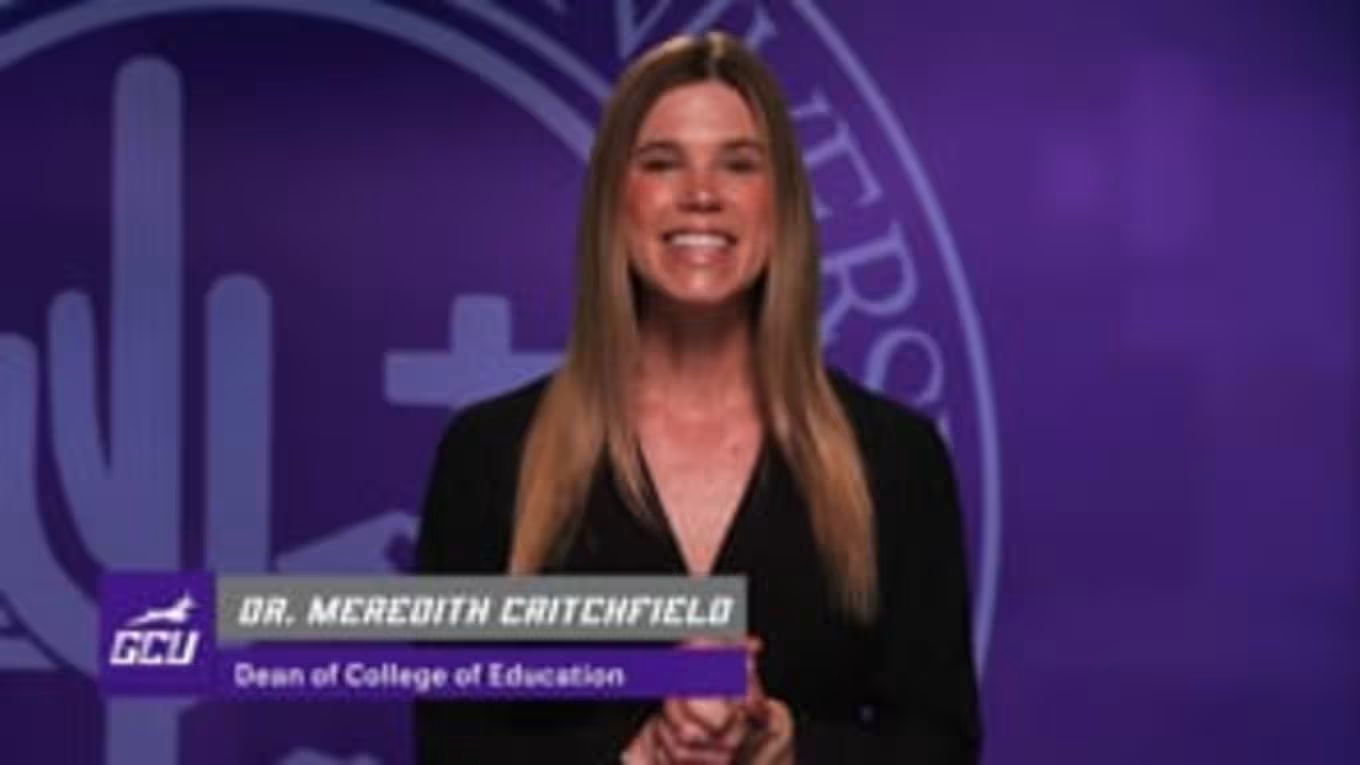MEd in Early Childhood Education and Early Childhood Special Education

MEd in Early Childhood Education and Early Childhood Special Education
journey today.
Prepare to make a positive difference in the lives of those who require early childhood special education (ECSE) by earning your Master of Education in Early Childhood Education and Early Childhood Special Education at Grand Canyon University.
This master’s in early childhood education and early childhood special education online degree is offered by the College of Education. Aspiring ECSE teachers closely examine instructional and assessment methodologies, as well as the psychological, emotional and developmental needs of young children. Candidates will explore field experience opportunities in both inclusive learning environments and special education birth to pre-K and K-3 environments. GCU candidates are trained to serve as effective advocates who positively influence children, families and communities in which they teach.

GCU provides the convenience and flexibility of earning your early childhood education master’s degree online. Through a combination of theoretical coursework and practical experiences, the online format allows working professionals to balance their career commitments while advancing their education.

ECSE Curriculum
This early childhood special education and early childhood education master’s degree program, which leads to initial teacher licensure, is designed for students who hold a bachelor’s degree in a non-education field. With a master’s in early childhood education and early childhood special education, graduates can learn to transition to a career in education.
The ECSE curriculum is aligned with the standards of the Interstate New Teacher Assessment and Support Consortium (InTASC), the International Society for Technology in Education (ISTE), the National Association for the Education of Young Children (NAEYC) and the Council for Exceptional Children (CEC).
Children with learning differences need extra support to reach their full potential. Graduates of this early childhood education and early childhood special education master’s degree program have the opportunity to learn to apply evidence-based pedagogical methods that support young learners as they develop crucial academic and life skills.
Students earning a master’s in early childhood education and early childhood special education online degree will acquire the following core competencies:
In addition, all students are required to complete practicum/field experiences and student teaching experiences in both general education and special education settings.
What’s the Difference Between Licensure and Non-Licensure Programs?
All states have established eligibility criteria for teachers, including educational and credentialing requirements. Students who graduate from an education degree program that leads to licensure are then eligible to obtain a state license to teach in any public or private school.
This early childhood education and early childhood special education degree from GCU leads to dual certification in Arizona for the following certification options:
A non-licensure program still presents initial licensure content, rather than advanced content. Students who graduate from a non-licensure program may still be eligible to teach in limited settings, which may include certain charter, private or early-learning school environments. Licensing requirements are different for each state, so be sure to check with the Board of Education in the state in which you will be teaching.

Early childhood education and early childhood special education is the key for giving every child a solid foundation for lifelong learning. This master’s degree can help you prepare aspiring ECSE teachers to make a positive impact by working with children from birth through the third grade.
Graduates may pursue the following teaching opportunities in public or private schools:
Preschool teacher
Postsecondary education teacher
Kindergarten teacher
Elementary school teacher
Teaching assistant
$63,670
Median annual wage for kindergarten and elementary school teachers as of May 20231
$65,910
Median annual wage for special education teachers as of May 20232
MEd in Early Childhood Education and Special Education Industries
As a master’s degree graduate, you may perform tasks that include coordinating programs, developing curriculum, performing research, developing policies related to early childhood and special education, or advocating for young children with exceptionalities.
You may be able to find a career in one of various industries that provide services to children, such as:
Nonprofit organizations
Public and private schools
Early intervention programs
Government agencies
Healthcare organizations
Private practices
Frequently Asked Questions
If you are considering pursuing an MEd in early childhood education and special education, we've compiled these frequently asked questions to provide you with more information about this degree and to help you make informed decisions about your education and future career.
Earning your master’s in early childhood education and early childhood special education may be right for you if you have a passion for working with young children, helping them learn and develop and aspire to have a positive impact on their lives. Additionally, according to the BLS, the need for special education teachers and services is expected to increase due to disabilities being identified earlier and more children with exceptionalities enrolling into special education programs.3
This MEd in early childhood education requires effort and dedication that may require additional skills and knowledge related to the unique needs of young children with exceptionalities. This may involve learning about assessment and intervention strategies, collaboration with families and other professionals and the legal and ethical considerations related to special education. Therefore, while the program's difficulty level may vary from person to person, it can generally be considered a challenging degree program that requires a significant commitment of time and effort.

Begin Shaping Youth Education
Prepare yourself to pursue a career that can make a positive difference in the lives of young children.
If you are seeking licensure/certification, please refer to the Accreditation and Compliance/State disclosures link for the specific program of interest’s website for your location and/or employment state licensure requirements, per 34 CFR 668.14(b)32 and 668.43(c).
1 The earnings referenced were reported by the U.S. Bureau of Labor Statistics (BLS), Kindergarten and Elementary Education School Teachers as of May 2023, retrieved on Nov. 13, 2024. Due to COVID-19, data from 2020 to 2023 may be atypical compared to prior years. BLS calculates the median using salaries of workers nationwide with varying levels of education and experience. It does not reflect the earnings of GCU graduates as kindergarten and elementary education school teachers, nor does it reflect the earnings of workers in one city or region of the country or a typical entry-level salary. Median income is the statistical midpoint for the range of salaries in a specific occupation. It represents what you would earn if you were paid more money than half the workers in an occupation, and less than half the workers in an occupation. It may give you a basis to estimate what you might earn at some point if you enter this career. Grand Canyon University can make no guarantees on individual graduates’ salaries. Your employability will be determined by numerous factors over which GCU has no control, such as the employer the graduate chooses to apply to, the graduate’s experience level, individual characteristics, skills, etc. against a pool of candidates.
2 The earnings referenced were reported by the U.S. Bureau of Labor Statistics (BLS), Special Education Teachers as of May 2023, retrieved on Nov. 13, 2024. Due to COVID-19, data from 2020 to 2023 may be atypical compared to prior years. BLS calculates the median using salaries of workers nationwide with varying levels of education and experience. It does not reflect the earnings of GCU graduates as special education teachers, nor does it reflect the earnings of workers in one city or region of the country or a typical entry-level salary. Median income is the statistical midpoint for the range of salaries in a specific occupation. It represents what you would earn if you were paid more money than half the workers in an occupation, and less than half the workers in an occupation. It may give you a basis to estimate what you might earn at some point if you enter this career. Grand Canyon University can make no guarantees on individual graduates’ salaries. Your employability will be determined by numerous factors over which GCU has no control, such as the employer the graduate chooses to apply to, the graduate’s experience level, individual characteristics, skills, etc. against a pool of candidates.
3 U.S. Bureau of Labor Statistics. (2024, Aug. 29). Special Education Teachers. Occupational Outlook Handbook. Retrieved Nov. 13, 2023.
